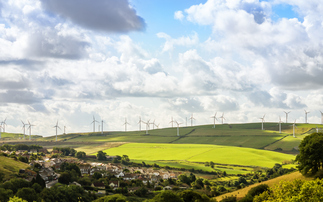
The sharp reduction in energy demand across Europe this winter highlights the pace of decarbonisation that is possible when there is sufficient political will
One of the most common (and annoying) arguments put forward by some environmental activists is that all that is needed to tackle the climate crisis is political will. As hypotheses go it is both unanswerable and yet frustratingly partial.
Of course, we could decarbonise faster if there was the political will. But political will is not some unvarying constant. There is no magic well at which we can all drink deep of the requisite political courage. It is instead a renewable, constantly evolving, fully endogenous resource. It has to be manufactured, nurtured, and harvested at the appropriate time and in the optimum manner.
The response to those who lament the lack political will is, 'fine, but why is it missing? How are you going to build it? What would you do with it once you've got it? How are you going to stop it burning out?'
These are all good questions, because on multiple fronts once you have some political will it can be transformational.
Further evidence to that point was provided today by a new report from think tank Ember on what happened to the European energy market this winter - or rather what didn't happen.
The talk at the start of this winter was of soaring energy costs, gas shortages, rolling blackouts, economic crisis, and the ability of the Kremlin's weaponisation of gas supplies to effectively splinter the western alliance. But while the past few months have undoubtedly been tougher than everyone would have liked, ultimately none of the worst case scenarios came to pass. Grids remained stable, recessions were largely avoided, support for Ukraine frayed a little at the fringes but remained broadly intact.
What happened? Well, a milder than usual winter undoubtedly helped ensure energy supplies were maintained, while exchequers spent a fortune cushioning their economies against the worst of the inevitable energy price hikes.
But the political will to tackle the crisis also manifested itself in two ways that are crucial for the net zero transition.
First up, there was the bloc's long term commitment to renewables deployment, which meant that when the energy supply crunch came renewables were able to minimise the need for costly gas imports. As Ember's analysis shows, renewables provided more power to EU grids than fossil fuels over the past six months. Fully 40 per cent of EU electricity came from renewables over the period compared to 37 per cent from fossil fuels. Gas generation fell 13 per cent year-on-year, and even coal generation - which many people believed would step in to replace costly gas - fell 11 per cent. It was a landmark achievement. Renewables saved the continent from catastrophe.
However, this encouraging trend was amplified by a remarkable exercise in short term political will. Governments and price signals across the bloc urged businesses and households to take steps to save energy - and they did just that. Lights were turned off, factories were upgraded, and swimming pools were cooled. Overall, winter power demand was down 6.2 per cent compared to the five year average. Some countries drove demand down by more than 10 per cent in the space of a few months. In total, the bloc saved itself €12bn and a whole lot of heartache.
It shouldn't take a war and an energy supply crisis to get governments and businesses to take energy efficiency seriously. But it is instructive to see the pace and scale of what can be achieved - when there's the political will.
A version of this article first appeared as part of BusinessGreen's Overnight Briefing email, which is available to all BusinessGreen Intelligence members.











